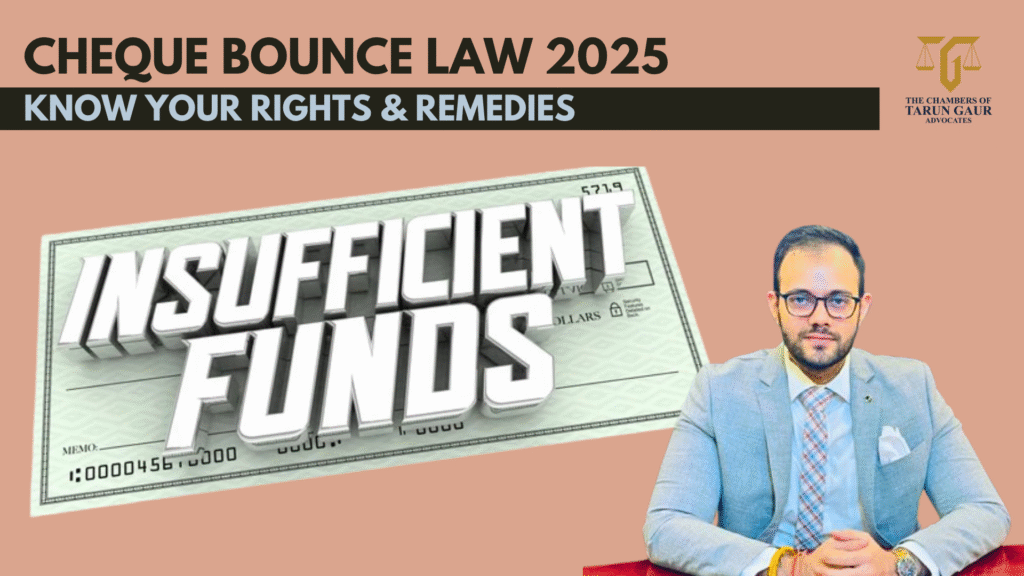By Advocate Tarun Gaur – Cheque Bounce & Criminal Law Specialist in Delhi
Cheque bounce cases in India are on the rise due to the increasing number of financial transactions made through banking channels. A bounced cheque—technically called dishonour of cheque—occurs when a cheque is returned unpaid by the bank due to insufficient funds, signature mismatch, or account closure.
If you’re facing such a situation and wondering how to recover money from a bounced cheque or how to defend against a cheque bounce complaint, this blog is for you.
🛠️ What To Do When a Cheque Bounces?
The first step is to act quickly. Here’s what you must do if your cheque gets dishonoured:
-
Cheque Return Memo: Obtain a written memo from your bank explaining the reason for non-clearance.
-
Legal Notice: Within 30 days of the memo, send a legal demand notice under Section 138 of the Negotiable Instruments Act, 1881.
-
File a Complaint: If no payment is made within 15 days of receiving the notice, file a cheque bounce complaint before the Magistrate within the next 30 days.
⚠️ Time is of the essence. Delay in sending notice or filing a complaint can result in dismissal.
⏳ Time Limit & Duration of Cheque Bounce Cases
Though courts aim to resolve cheque bounce complaints within 12 months, in practice, such cases may take 1.5 to 2 years. Key procedural stages include:
-
Service of summons
-
Appearance of both parties
-
Framing of notice under Section 251 CrPC
-
Evidence and trial stages
🕵️ Cheque Bounce Due to Fraud or Fake Cheques
If you’ve received a fake, forged, or fraudulent cheque, you must:
-
File a police complaint under Sections 420, 467, and 468 of the IPC.
-
Preserve the original cheque and return memo for evidence.
-
Simultaneously proceed with a complaint under Section 138 NI Act.
⚰️ What Happens If Complainant or Accused Dies?
-
If the Complainant Dies: Their legal heir can apply to continue the case. If not, the case may get dismissed.
-
If the Accused Dies: The criminal complaint abates (closes), since criminal liability doesn’t transfer. However, a civil recovery suit does not abate and can still proceed against the estate of the accused.
✅ How to Win a Cheque Bounce Case
To ensure recovery, the complainant must:
-
Maintain strong documentation – original cheque, bank memo, legal notice, and postal receipts.
-
Follow all deadlines.
-
Engage a competent cheque bounce lawyer.
-
Prove that the cheque was issued against a legally enforceable debt or liability.
🛡️ How to Defend Yourself in a Cheque Bounce Case?
You may be acquitted if you prove that:
-
The cheque was issued as security, not for repayment.
-
There was no legal debt or liability.
-
The notice wasn’t served properly.
-
The complaint was filed beyond limitation.
🔄 New Legal Provisions in Cheque Bounce Law (2025)
-
Section 143A NI Act: Courts may order the accused to pay interim compensation of up to 20% of the cheque amount.
-
Section 148 NI Act: Appellate courts can require the accused to deposit 20% of the fine or compensation as a precondition for appeal.
-
Summary Trials: Courts are encouraged to use quicker, summary procedures to dispose of cheque bounce cases efficiently.
⚖️ Impact of BNSS on Cheque Bounce Cases
The new Bharatiya Nagarik Suraksha Sanhita (BNSS) has introduced a mandatory pre-cognizance hearing for the accused in cheque bounce cases, making it slightly more cumbersome for complainants.
📝 Expert Note: This may reduce the deterrent effect of Section 138 proceedings. The Supreme Court’s final ruling on this provision’s constitutional validity is awaited.
👮 Can You File a Police Complaint in Cheque Bounce Cases?
Yes, apart from the NI Act proceedings, you can:
-
Lodge an FIR under Section 420 IPC (cheating) if there was fraudulent intent from the start.
-
Pursue both civil and criminal remedies depending on the facts of your case.
📌 Conclusion: Legal Awareness is Key
Whether you are a victim of cheque dishonour or a person accused under Section 138, understanding the procedure and your rights is crucial.
🔹 For Complainants: Act fast, retain documents, and hire a qualified lawyer.
🔹 For Accused: Don’t panic. There are valid defences. Consult a lawyer early.
📈 Frequently Asked Questions (FAQs)
-
What is the punishment for cheque bounce in India?
-
How to file a cheque bounce case under Section 138?
-
What are the latest cheque bounce laws in 2025?
-
Can cheque bounce case be filed after 30 days?
-
What happens if cheque bounce accused dies?
📞 Need Legal Help?
If you’re dealing with a cheque bounce issue—whether as a complainant or an accused—consult Advocate Tarun Gaur, a trusted name in cheque bounce, white-collar crime, and commercial litigation in Delhi.

